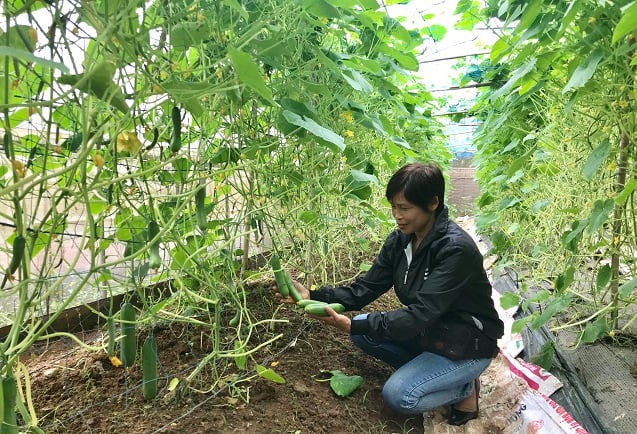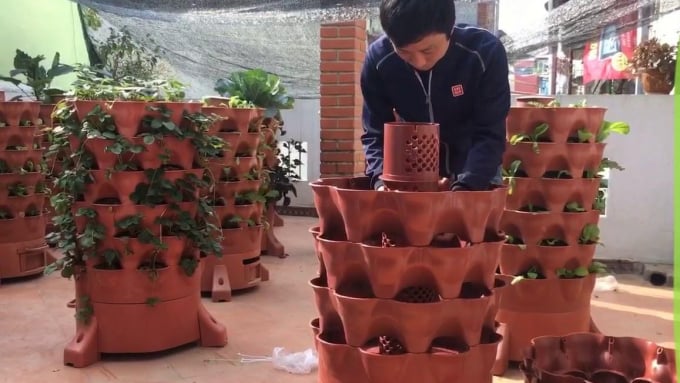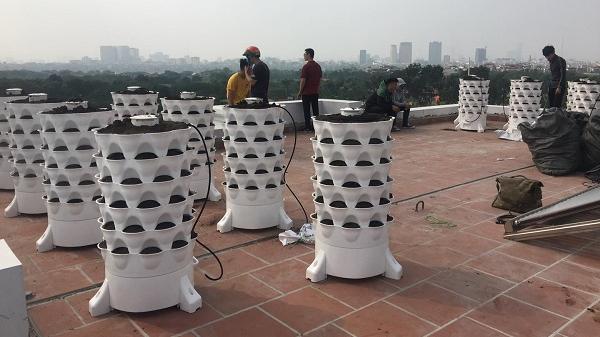May 21, 2025 | 03:52 GMT +7
May 21, 2025 | 03:52 GMT +7
Hotline: 0913.378.918
May 21, 2025 | 03:52 GMT +7
Hotline: 0913.378.918

A vegetables growing model applying advanced irrigation technology in Hanoi.
Symbiosis enhances the main functions of food systems. Agroecological practices make full use of symbiotic relationships to increase the efficiency of resource usage and plant resilience.
The symbiotic relationship in agroecology, which has been utilized by humans for thousands of generations, is presented in the form of nitrogen fixation from legumes by intercropping or rotational farming systems. This approach saves an estimated USD 10 million per year in terms of nitrogen fertilizers while still contributing to soil health. Another example is that approximately 15% of nitrogen fertilizers used for crops are derived from livestock manure - a combination based on plants and animals.
Using these symbiotic relationships, the elements in an agroecological system will treat waste more efficiently, which also means more recycling. By mimicking natural ecosystems, agroecological practices help promote the recycling of nutrients, biomass and water in production systems, and more recycling equals lower economic and environmental costs in agro-production.

Eco Vietnam Organic Vegetable Towers are nearly as tall as an adult's chest.
Eco Vietnam Organic Agriculture JSC has recently demonstrated a great example by introducing the start-up team “Eco Vietnam Organic Vegetable Tower (EVOVT)”.
Mr. Tran Dinh Kham, a team member of EVOVT, said that the standard tower has six floors. While each tower occupies an area of about 1m2, the harvested vegetable output is equivalent to 4-5m2 of plane land.
The unique feature of EVOVT lies in its microorganism core and accompanying parts such as a trash tray and a tray for worm tea juice (a type of irrigation water rich in nutrients).
The microbiological core has a diameter of 15cm, approximately 1m high, capable of processing 30kg of fresh organic waste each month thanks to normal composting principles as well as the activity of Perionyx excavatus (composting worms) and natural microflora in the soil.
This microbiological core acts as the digestive organ of the vegetable tower, creating decomposed waste as food for the worms. Decomposed waste water, worm juice and residual irrigation water flowing down are collected by the worm tea tray. Growers can then use this to directly irrigate the vegetables.
Composting worms eat rotting organic waste, loosen the soil by digging and discharge vermicompost to increase the fertility of the soil. After three months the organic waste in the core of the tower will be processed into organic fertilizer, which can be used to re-fertilize the tower.
Thanks to this natural circulation principle, growers using EVOVT do not need to fertilize or change the soil. The more vegetables planted, the better and more fertile the soil becomes. The core of the tower also plays a role in creating air circulation in the soil. The soil becomes more porous due to the movement of composting worms, thus retaining its richness in oxygen, making it easy for plant roots to absorb oxygen and minerals.

An organic vegetable tower model on the roof of an apartment building.
It is becoming increasingly clear that the concept of agroecology is not only useful in rural or large areas but can also be a foundation for breakthroughs in urban areas.
There are hundreds of square meters of roofs in Vietnam covered with corrugated iron. Therefore rooftops can be used as a location to treat a large amount of organic waste, because according to statistics 65-70% of domestic waste is organic waste treatable at home.
Another advantage is that when applying this model people will not have to pay excessive costs in the selling process while the products can be sold at retail prices, killing two birds with one stone: protecting the environment and earning additional income.
For example, with the average cost of vegetables for each household in Hanoi and Ho Chi Minh City as VND 1.2-1.5 million/month, according to clean organic vegetable standards, organic vegetable growers would not only contribute to solving existing environmental issues but could also generate an income of VND 5-10 million/month after deducting costs.
Agroecology is capable of creating human and social value. Through smart and advanced farming models, agroecology creates more job opportunities for women, ensures a varied and healthy diet and empowers humans and communities as a whole to join hands and solve life’s daily problems.
Translated by Samuel Pham

(VAN) Japan's grant aid project contributes to capacity building, promoting organic agricultural production, and fostering sustainable community development in Dong Thap province.

(VAN) For years, the CRISPR-Cas9 genome technology has been reshaping genetic engineering, a precision tool to transform everything from agriculture to medicine.

(VAN) Vietnam aims to become a 'leader' in the region in the capacity and managing effectively soil health and crop nutrition.
![Reducing emissions from rice fields: [Part 1] Farming clean rice together](https://t.ex-cdn.com/nongnghiepmoitruong.vn/608w/files/news/2025/05/05/z6509661417740_a647202949c539012a959e841c03e1d3-nongnghiep-143611.jpg)
(VAN) Growing clean rice helps reduce environmental pollution while increasing income, allowing farmers to feel secure in production and remain committed to their fields for the long term.
/2025/05/19/5136-1-144800_230.jpg)
(VAN) The Nghe An Provincial People's Committee has just approved the list of beneficiaries eligible for revenue from the Emission Reductions Payment Agreement (ERPA) in the North Central region for the year 2025.

(VAN) 14 out of 35 domesticated elephants in Dak Lak province have had their living conditions improved, with 11 of them currently participating in the non-riding elephant tourism model.

(VAN) Muong Nhe Nature Reserve hopes that being upgraded to a national park will lay the foundation for forest protection efforts to be carried out in a systematic, modern, and sustainable manner.